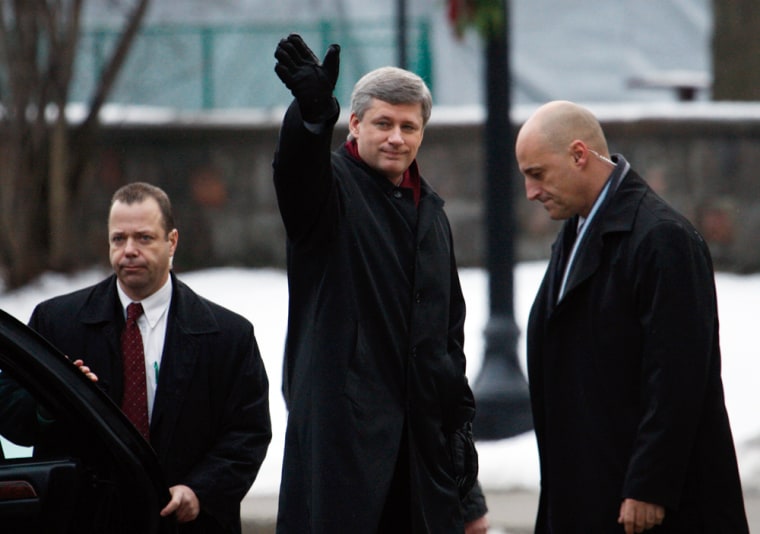Prime Minister Stephen Harper shut down Parliament on Thursday in an unprecedented attempt to keep his government in power, fending off a no-confidence vote he was all but certain to lose.
Less than two months after winning re-election, Harper successfully asked the unelected representative of the head of state for the authority to close down Parliament until Jan. 26, hoping to buy enough time to develop a stimulus package that could prop up the economy.
"Today's decision will give us an opportunity — I'm talking about all the parties — to focus on the economy and work together," Harper said after the private meeting.
Governor General Michaelle Jean, who represents Britain's Queen Elizabeth II as head of state, granted the unusual request to suspend parliament. Had she refused, Harper would have had two choices: step down or face a no-confidence vote Monday he was sure to lose.
Harper would not offer details on their conversation.
Three opposition parties united against Harper, charging he has failed to insulate Canada from the global financial crisis. The credit crisis and a global selloff of commodities have slowed Canada's resource-rich economy, and the finance minister said last week he expects a recession.
"For the first time in the history of Canada the prime minister is running away from the parliament of Canada," said Liberal leader Stephane Dion, who headed up the opposition movement against Harper.
He said the coalition would seek to oust Harper unless he makes a "monumental change" in dealing with the economy and the opposition.
Sad day for Canada
The opposition was also outraged by a government proposal to scrap public subsidies for political parties, something the opposition groups rely on more than the Conservatives. Although that proposal was withdrawn, the opposition has continued to seek Harper's ouster, saying he has lost the trust and confidence of Parliament.
Opposition New Democrat leader Jack Layton called it a sad day.
"He's trying to lock the door of Parliament so that the elected people cannot speak," Layton said. "He's trying to save his job."
Layton said the shutdown only delays Harper's inevitable defeat.
"You can run but you can't hide," said Liberal legislator Bob Rae, predicting the opposition would bring down Harper early next year over the budget.
Harper's Conservative Party was re-elected Oct. 14 with a strengthened minority government, but still must rely on the opposition to pass legislation.
The Liberals, New Democrats and Bloc Quebecois, which together control a majority of parliament's 308 seats, had signed a pact agreeing to vote this coming Monday to oust Harper and setting the structure for their proposed coalition government.
Unprecedented move
A governor general has never been asked to suspend parliament to delay an ouster vote when it was clear the government didn't have the confidence of a majority of legislators.
"There is no precedent whatsoever in Canada and probably in the Commonwealth," constitutional scholar and Queen's University political scientist Ned Franks said, referring to the organization of English-speaking nations. "We are in uncharted territory."
Nelson Wiseman, an associate professor at the University of Toronto, said he expected Harper to resign immediately had Jean turned him down.
"He's got no business asking for it," Wiseman said. "This is an obvious attempt to avoid and evade Parliament."
More on Stephen Harper
